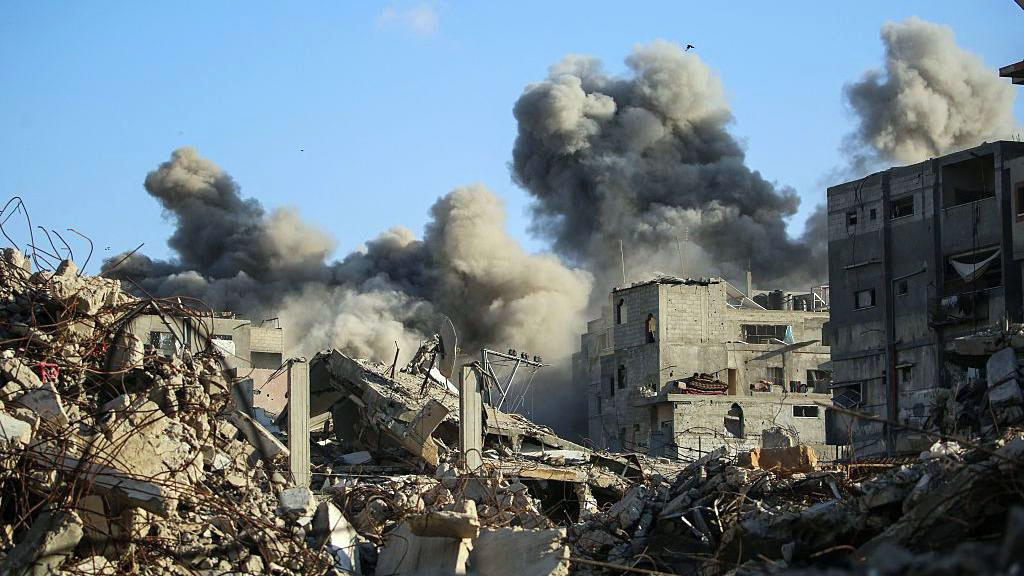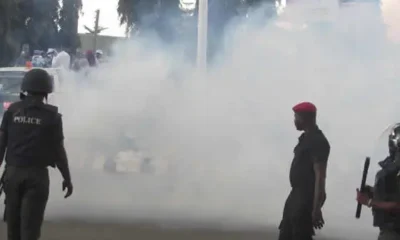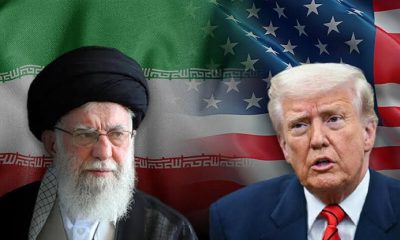International
Russia’s invasion of Ukraine threatens to derail Iran nuclear talks

VIENNA — Fears mounted Monday that the Iran nuclear deal may become collateral damage in the Ukraine war as Russia pressed its demand to be exempted from U.S. sanctions in any future business dealings with Iran.
Negotiators had hoped to finalize an agreement to revive the 2015 nuclear deal imminently and have already allowed several presumed deadlines to slip after 11 months of talks on ways to bring the deal back to life.
The talks have been focused on how to bring both the United States and Iran back into compliance with the Joint Comprehensive Plan of Action, or JCPOA as the deal is known, by rolling back sanctions imposed by the United States after it pulled out of the agreement in 2018 and the advances later made by Iran in its nuclear program in response to the U.S. sanctions.
The eruption of war in Ukraine has thrown up additional complications by overturning Russia’s relations with the Western nations involved in the negotiations, including the United States, Britain, France and Germany, along with Iran and China. Because the United States withdrew from the agreement, the talks at the Palais Coburg Hotel in Vienna have been taking place among the remaining parties, with negotiators shuttling between the talks and the U.S. delegation at a different hotel.
In a phone call with Iranian Foreign Minister Hossein Amirabdollahian on Monday, Russian Foreign Minister Sergei Lavrov reiterated that Russia wants the revival of the nuclear deal to be accompanied by U.S. guarantees that sanctions imposed by the West in response to Russia’s invasion of Ukraine won’t apply to Russian trade or investment with Iran.
Lavrov told Amirabdollahian that the deal’s resuscitation “should ensure that all its participants have equal rights regarding the unhindered development of cooperation in all areas,” the Russian Embassy in Iran said on Twitter.
The demand, first raised by Lavrov at a news conference in Moscow on Saturday, has rocked the negotiations underway in Vienna.
READ ALSO:
- Igboho can’t leave Benin Republic despite release – Lawyer
- Dead Lagos BRT passenger found naked with body parts missing – Relative
- Don’t Feel Intimidated To Wear Hijab On Duty, Hijrah Council Tells Female Police Officers
This was the first time Russia had given any indication that its position might have shifted, and diplomats are now scrambling to assess what the new demands mean and how they might affect the chances of getting a revived deal. Iran seemed as stunned as any of the other countries, with Iranian officials complaining to Iranian media that they only learned of the Russian demand from news reports.
U.S. Secretary of State Antony Blinken indicated in an interview Sunday that the United States would not be prepared to bargain over the sanctions imposed on Russia for the sake of the nuclear deal, saying the issues are unrelated.
“The sanctions that are being put in place and that have been put in place on Russia have nothing to do with the Iran nuclear deal and the prospects of getting back into that agreement,” he told CBS’s “Face the Nation.” “These things are totally different and are — just are not in any way linked together.”
Iran is still pushing for further concessions from the United States on issues related to economic guarantees and removing Iranian entities from the U.S. list of designated terrorists before agreeing to resume adherence to the deal, diplomats say. It is still possible the negotiations could collapse regardless of any shift in Russia’s position, a Western negotiator said.
But diplomats now have to contend with the possibility that Russia may try to upend the deal altogether or to use the talks as a bargaining chip to exact concessions from the West on sanctions related to Ukraine.
“There’s a real tension between Russia’s long-standing interest in containing the Iran nuclear program and this new Russia that seems willing to bring its relations with the West crashing down,” said Henry Rome, an analyst with the Eurasia Group.
Russia may also now have no interest in remaining in a revived deal that would benefit the United States and its Western allies but would potentially damage Russian interests by bringing oil prices down, said Karim Sadjadpour, a senior fellow at the Carnegie Endowment for International Peace. Iran would be able to sell its oil on the open market again, which could ease tight global supplies and bring prices down by as much as 10 percent.
“Considering the magnitude of the global pressure against Russia, it’s understandable why they might try and hold the Iran nuclear deal hostage to secure their own interests,” he said. “Russia wants the world to feel the economic pain of an embargo against Russian oil. Helping to get Iranian oil back on the market would soften the global financial blow.”
Russia’s participation in the agreement isn’t essential, but the original JCPOA assigns Russia an important role in shipping out and storing Iran’s excess stocks of enriched uranium. The original deal is also backed by a U.N. Security Council resolution, which Russia could veto if it chooses to oppose the revived deal.
Those are issues that could be worked around, but that would be likely to put a further brake on a resolution of the talks, diplomats say. In the meantime, Iran is continuing to enrich uranium and inching closer to what is known as breakout point, meaning that it would have enough enriched uranium to build a nuclear weapon should it choose to do so. “Time is of the essence,” a senior Western diplomat said.
The Washington Post
International
Israeli Airstrikes Kill 12 in Gaza as Violence Persists Despite Ceasefire

Israeli Airstrikes Kill 12 in Gaza as Violence Persists Despite Ceasefire
At least 12 Palestinians have been killed in Israeli airstrikes across the Gaza Strip, the territory’s civil defence agency reported on Sunday, marking one of the deadliest days since a fragile ceasefire was implemented. The strikes hit multiple areas, including Jabalia refugee camp in northern Gaza and the southern city of Khan Younis, leaving several others injured.
The Gaza Civil Defence, responsible for rescue and emergency operations under Hamas, said one airstrike struck a tent sheltering displaced civilians in Jabalia, killing at least five people and wounding others. Another strike in Khan Younis also claimed five lives, while additional shelling in Beit Lahia and western Gaza City caused further casualties. Local authorities said most victims were civilians, including families displaced by previous attacks.
READ ALSO:
- FBI Probe Continues as Ex‑Church Minister Who Confessed to Child Abuse Remains Free
- Presidency Dismisses El-Rufai’s Thallium Claim as Diversion From N432bn Probe
- Ghana Moves to Extradite Russian Man Over Secret Sex Video Scandal
The Israel Defence Forces (IDF) said its operations targeted armed militants and underground infrastructure allegedly used to launch attacks, describing the strikes as a response to ceasefire violations. Palestinian authorities condemned the strikes as a massacre and a breach of the truce, while international observers expressed concern over the continuing civilian casualties.
Since the U.S.-brokered ceasefire in October 2023, tensions in Gaza have remained high, with sporadic clashes and violations on both sides. Gaza health authorities report that over 600 Palestinians have been killed and more than 1,600 injured by Israeli strikes since the truce took effect. Humanitarian organisations warn that repeated airstrikes have devastated infrastructure, leaving displaced families vulnerable and worsening living conditions.
International observers note that the ongoing violence threatens reconstruction efforts and regional stability. With limited access for media and aid agencies, verifying casualty figures remains difficult, though reports consistently highlight the severe impact on civilians and displaced families.
The Gaza civil defence called on residents to stay vigilant, avoid military targets, and seek safety as authorities continue to respond to emergency situations across the territory. The situation underscores the fragility of the ceasefire and the urgent need for renewed diplomatic efforts to prevent further civilian casualties.
Israeli Airstrikes Kill 12 in Gaza as Violence Persists Despite Ceasefire
International
FBI Probe Continues as Ex‑Church Minister Who Confessed to Child Abuse Remains Free

FBI Probe Continues as Ex‑Church Minister Who Confessed to Child Abuse Remains Free
An ex‑minister of a secretive Christian group who publicly admitted to child sexual abuse during a BBC interview remains free more than two years later, despite ongoing investigations by the Federal Bureau of Investigation (FBI) and renewed allegations from other victims. The man, Robert Corfield, once served as a minister in a shadowy church commonly known as The Truth or the Two by Twos — a global network of itinerant ministers with no official headquarters or widely recognised name. In early 2024, Corfield told the BBC that he had sexually abused a boy named Michael Havet for six years starting in the 1980s when Havet was 12 years old, in Saskatchewan, Canada.
Corfield’s admission was part of a larger wave of revelations about abuse in the Two by Twos community. His name was among more than 1,100 reported to a hotline set up to document cases of sexual abuse within the church. About a month after the BBC’s initial investigation, the FBI launched a probe into allegations of child sexual abuse within the group. Although Corfield spoke to FBI agents in late 2024 or early 2025, saying he “responded with the truth,” he has not been contacted by authorities since that visit and remains at liberty in the U.S. state of Montana. When asked if he fears arrest, Corfield acknowledged that “there is that possibility.”
READ ALSO:
- Presidency Dismisses El-Rufai’s Thallium Claim as Diversion From N432bn Probe
- Ghana Moves to Extradite Russian Man Over Secret Sex Video Scandal
- Residents Flee as Gunmen Launch Fresh Attack on Kwara Community
Authorities, including the Royal Canadian Mounted Police (RCMP), have also been involved. The RCMP confirmed it investigated historic sexual assaults that occurred in the 1980s and sent files to Crown prosecutors for assessment, while the Saskatchewan Ministry of Justice noted it does not comment on cases currently under investigation. A separate alleged victim, identified only as Edward, came forward in 2025 claiming he was sexually assaulted by Corfield in 1974 at age 11, well before Corfield’s abuse of Michael. Edward also described alleged grooming behaviours, adding to concerns about Corfield’s past conduct.
Corfield’s case is part of broader allegations of abuse in the Two by Twos community, which some survivors and investigators describe as insular and resistant to external scrutiny. Advocacy groups have reported hundreds of alleged historical abusers connected to the sect globally. In the United States, a former elder of the Two by Twos was sentenced to 120 years in prison for possessing child sexual abuse material, highlighting that criminal accountability is possible when prosecutions occur. Survivors and advocates have criticised the church leadership’s historical handling of abuse allegations, alleging that serious complaints were ignored or covered up. Former members say the group’s structure — with ministers often hosted in private homes and an emphasis on internal solutions — made it easier for abuse to go unreported for decades.
While investigators continue their work, Corfield’s freedom has drawn sharp criticism from survivors like Michael, who has expressed confusion and frustration at the slow pace of legal action. Advocates have urged authorities in both the United States and Canada to urgently pursue all leads, not only against individual perpetrators but also over potential institutional failures within the church. Support networks for survivors have also grown online and through advocacy organisations, offering counselling and community resources for victims of the alleged abuse. Despite these efforts, many survivors say justice remains elusive more than two years after the minister’s public confession.
FBI Probe Continues as Ex‑Church Minister Who Confessed to Child Abuse Remains Free
International
Trump Halts Minnesota Immigration Crackdown After Fatal Shootings, Protests

Trump Halts Minnesota Immigration Crackdown After Fatal Shootings, Protests
The Trump administration has officially halted Operation Metro Surge, a controversial immigration enforcement operation in Minnesota, following widespread protests, political backlash, and the deaths of two U.S. citizens. The decision was announced by Tom Homan, the U.S. “border czar,” who confirmed that President Donald Trump approved ending the monthslong crackdown.
Operation Metro Surge, launched in December 2025, focused on the Minneapolis–St. Paul metropolitan area, deploying nearly 3,000 federal immigration officers at its peak. The operation aimed to detain undocumented immigrants, which the Department of Homeland Security (DHS) described as targeting “criminal illegal aliens.” However, reports indicate that many detainees had no criminal records, including children and U.S. citizens, raising concerns about the operation’s scope and fairness.
- Army University Professor Dies in Boko Haram Captivity After Nearly One Year
- MURIC Calls Proposed US Sanctions on Nigerian Muslims ‘Lopsided’
- Supreme Court Affirms Muslim Students’ Right to Worship at Rivers State University
The crackdown drew intense public opposition after anti-ICE protesters Renée Good and Alex Pretti were fatally shot during separate incidents in Minneapolis. The shootings intensified calls for accountability and prompted local and national criticism of federal enforcement tactics.
In a statement, Homan said, “I have proposed and President Trump has concurred that this surge operation conclude.” He noted that a drawdown of federal personnel had already begun, with a smaller contingent remaining temporarily to transition operations and coordinate with local authorities.
During the operation, DHS reported over 4,000 arrests, though critics highlighted the disproportionate impact on communities and families, emphasizing the humanitarian and civil liberties concerns arising from the surge.
Minnesota officials, including Governor Tim Walz and Minneapolis Mayor Jacob Frey, welcomed the decision, calling the operation an overreach that harmed communities and strained trust between law enforcement and residents. Civil rights groups also praised the halt but urged comprehensive immigration reforms to prevent future abuses.
The end of Operation Metro Surge marks a significant development in the national debate over immigration enforcement, sanctuary policies, and federal authority, highlighting the challenge of balancing border security with human rights and community safety.
Trump Halts Minnesota Immigration Crackdown After Fatal Shootings, Protests
-

 News1 day ago
News1 day agoSaudi Arabia Confirms Sighting of Ramadan Crescent, Fasting Begins Wednesday
-

 metro2 days ago
metro2 days agoUS Freezes Assets of Eight Nigerians Over Boko Haram, ISIL, Cybercrime Links
-

 metro1 day ago
metro1 day agoLagos Woman Shares Ordeal After Alleged Rape, Sparks Nationwide Outcry
-

 News24 hours ago
News24 hours agoRamadan Begins in Nigeria as Sultan Confirms Crescent Sighting
-

 Entertainment2 days ago
Entertainment2 days agoMystery in Lekki: Police Probe Death of Two Nollywood Crew Found Lifeless in Parked Car
-

 metro2 days ago
metro2 days agoTerror in Lagos Traffic: Cutlass Gang Unleashes Mayhem on Mile 12–Ketu Road
-

 Auto2 days ago
Auto2 days agoAppeal Court Ruling on VIO Limited to Abuja, Not Lagos — LASG
-

 News2 days ago
News2 days agoTeargas, Chaos at EFCC as El-Rufai’s Supporters Clash with Security Operatives















